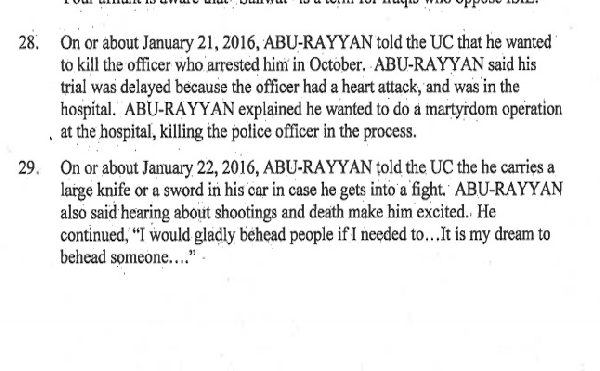
|
| Khalil Abu-Rayyan |
DETROIT — A Dearborn Heights man told an undercover FBI agent he planned to attack a church in Detroit and made several violent threats online on behalf of ISIS, according to legal documents.
Khalil Abu-Rayyan, 21, was arrested by Detroit Police last October for having marijuana and carrying a gun in his car without a concealed pistol license. He was released on bond, but was arrested again after trying to illegally acquire a weapon.
But according to a legal complaint, the FBI has been investigating Abu-Rayyan since May because of his extremist social media posts. The agency said it found that Abu-Rayyan had been interacting with ISIS propaganda accounts on Twitter as early as November 2014.
The suspect started corresponding with an undercover agent online in December 2015, the court document states. Abu-Rayyan repeatedly expressed support for ISIS.
He told the agent that he tried to shoot up one of the biggest churches in Detroit, without naming it.
“It’s easy and a lot of people go there,” Abu-Rayyan is quoted as saying. “Plus, people are not allowed to carry guns in church. Plus, it would make the news. Everybody would’ve heard. Honestly, I regret not doing it. If I can’t do jihad in the Middle East, I would do my jihad over here.”
Abu-Rayyan tweeted photos of himself carrying rifles and raising his index finger toward the sky— a gesture of support for ISIS.
He told the undercover agent that he wants to kill the officer who arrested him in October.
He also said he would “gladly behead people.”
“It’s my dream to behead someone,” Abu-Rayyan is quoted as saying.
His Twitter account (@khalilray21) has been suspended, but last July he received a Tweet scolding him for his apparent fondness for ISIS.
Abu-Rayyan appears to have engaged in Twitter debates about theology regularly.
“Your 1 sick person. Why don’t you go and join the Daeshbags if you agree with their retarded way of life or you no bottle?” a Twitter user wrote to him in July.
Substance abuse
A former classmate of Abu-Rayyan who wished not to be identified said he had an odd personality.
“I was not surprised,” the classmate said. “He was high every single day of high school.”
Dawud Walid, the executive director of the Council on American-Islamic Relations in Michigan, met with Abu-Rayyan’s father. Walid said the FBI informant appears to be a young woman whom Abu-Rayyan might have been trying to impress.
“What seems to be clear is that young man had substance abuse issues,” he said.
Walid said the verbal allegations made against Abu-Rayyan are not reflective of the legal case against him.
“He’s not being charged with anything that’s terrorism related,” he said.
Abu-Rayyan is facing drug and gun charges.
Walid said there is a prolific history of FBI informants acting as agents provocateur who incite people to make terrorism-related statements.
“This is specifically a problem with young men who have bravado and want to look like tough guys,” Walid said. “This could be a case of a young man on dope, who wants to act like a gangster to impress a young woman. This is something that is not uncommon.”
Walid faulted the government for its handling of such cases.
He said when young men are showing signs that they may need social services or mental health counseling, the government should intervene to help them. Instead, the FBI sends informants to at-risk youths to encourage engaging in illegal activities, so that law enforcement officials get an indictment.
Walid said the case brings to the forefront the need for the community to fight the mental health and substance abuse stigma.
Dr. Muzammil Ahmed, chair of the Michigan Muslim Community Council, said there are 250,000 Muslims in Southeast Michigan and that Abu-Rayyan is an aberration.
“We have wonderful relations with our interfaith partners,” he said. “Any threat to a place of worship —in this case a church— is something that we need to rally against. I am glad he’s been apprehended.”
However, Ahmed warned against jumping to conclusions before the investigation concludes, saying that mental health and other factors might have played a role in Abu-Rayyan’s behavior.
Ahmed said whether the threats were credible or not, young people need to know that what they say on the Internet has implications.
“My first worry is for our Christian friends and I hope that their programs and services are protected; my thoughts are with them,” Ahmed added. “I do hope that people realize that this is an anomaly and not the norm in relations among the people of faith in this area.”
Abu-Rayyan appeared twice in front of U.S. Magistrate Mona Majzoub this week. The detention hearing was postponed both times to allow Abu-Rayyan to sort out his legal defense. He had dismissed the public defender, seeking a private attorney, but he opted to retain the court-appointed lawyer on a hearing on Thursday.
His detention hearing is scheduled for Tuesday, Feb. 16 at 1 p.m.
On Thursday, Abu-Rayyan stood in front of Majzoub in a grey suit, looking around nervously, as his family members sat in the back of the courtroom. Among al the inmates there, he alone was shackled.
Several reporters followed Abu-Rayyan’s family out of the courtroom, but his relatives refused to comment.






Leave a Reply